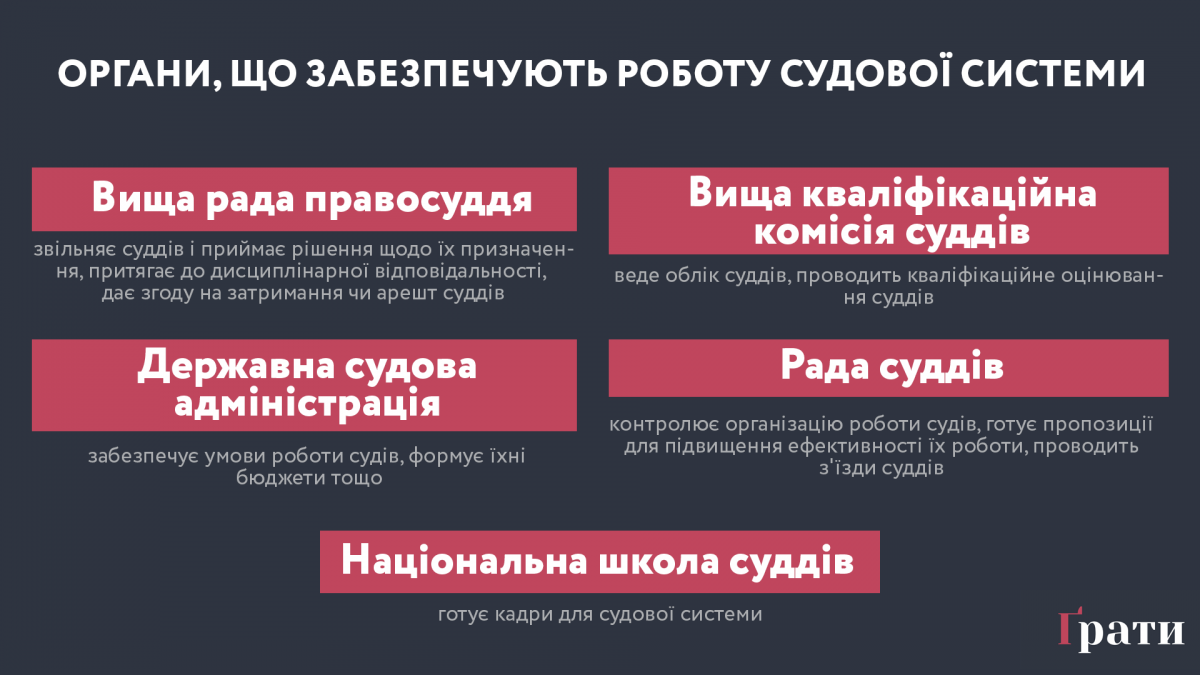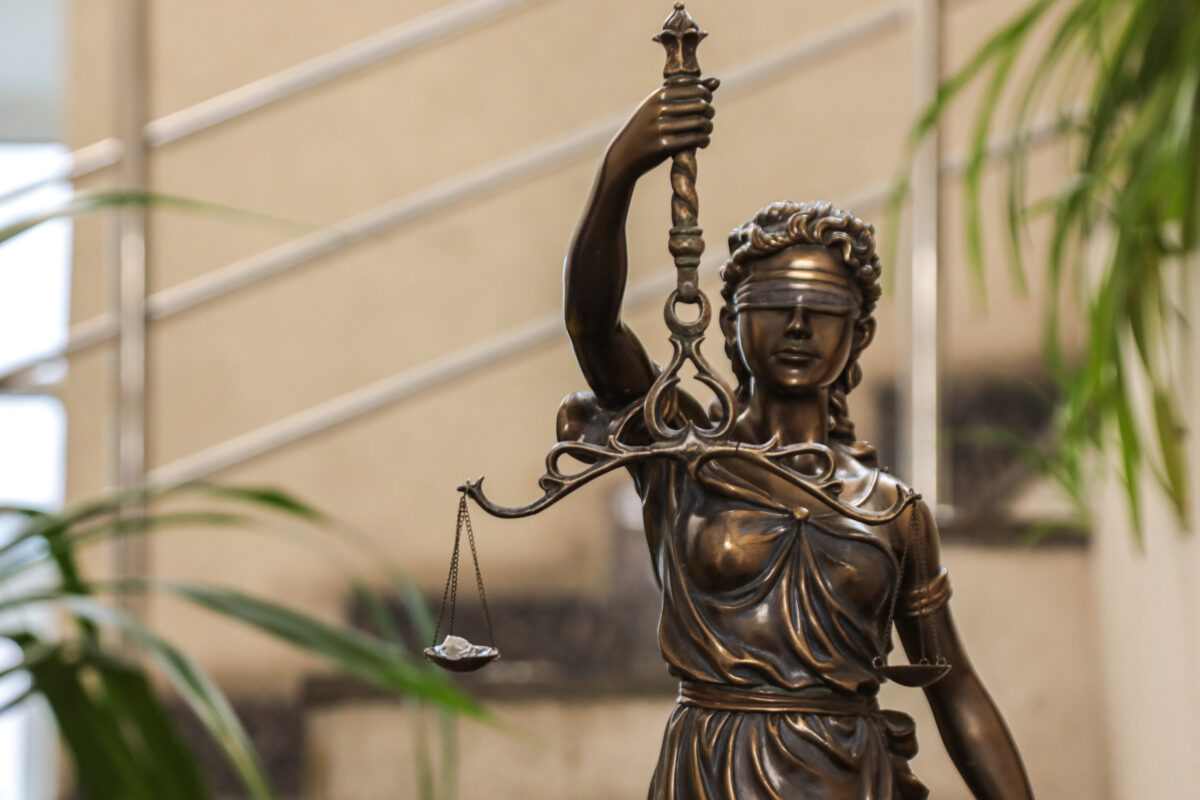Президент Владимир Зеленский назначил 114 судей в местные суды в начале мая этого года. В частности, в административные — 11 судей, в хозяйственные — 10, в общие — 93. Сейчас они еще не начали выполнять обязанности. Тем временем президент планирует подписать еще несколько указов о назначении судей.
Кто новоназначенные судьи, утолят ли они кадровый голод судебной системы, и почему в парламенте хотели усилить полномочия президента по назначению судей
Судьи-пятилетки
24 судьи из тех, кого назначил президент Зеленский, были те, у которых закончился пятилетний срок полномочий. Они прошли оценивание, проведенное нынешним составом Высшей квалификационной комиссии судей.
Речь идет о судьях, которые начали работать до 2016 года. Тогда по закону судей назначали сначала на пятилетний срок, а после этого они могли бессрочно его продлить — по решению Верховной Рады. Судебная реформа президента Петра Порошенко убрала норму о пяти годах и лишила парламент права делать назначения, аргументируя это необходимостью предостеречь судей от политического влияния.
На сегодня еще около 800 таких судей до сих пор не имеют полномочий осуществлять правосудие.
Чтобы переназначить судей, у кого заканчивался срок полномочий, Высшая квалификационная комиссия судей проводила их предварительное квалификационное оценивание. Несмотря на то, что после прихода к власти Владимира Зеленского в середине октября 2019 года Верховная Рада прекратила полномочия целого состава ВККС. Новый ее состав заработал только в начале июня 2023-го.
Судья без полномочий работает: должен приходить в суд, как и другие судьи, впрочем, не может рассматривать дела. Это влияло и на нагрузку других судей.
По данным Высшей квалификационной комиссии судей по состоянию на 20 мая 2024 года, местные суды заполнены на две трети (нехватка составляет почти 1,5 тысячи из 5 тысяч должностей), а апелляционной инстанции — наполовину (701 должность вакантна, при общем количестве должностей в 1357). В высших спецсудах (это Высший антикоррупционный суд и его палата, а также Высший суд по вопросам интеллектуальной собственности, который до сих пор не заработал) не хватает 55 судей, а в Верховном суде — 39 судей.
«На сегодняшний день остаются не закрытыми от 22% до 61% должностей судей в зависимости от специализации и инстанционности. Некоторые суды не осуществляют правосудие вследствие отсутствия судей. Это влияет как на доступ граждан и бизнеса к правосудию, так и на нагрузку судей, как следствие — отражается на сроках рассмотрения дел. Понятно, что сразу после подписания Указов проблема не будет решена окончательно, ведь объявленные конкурсы будут продолжаться до 2025 года, но это однозначно уже «свет в конце тоннеля», — написала на своей странице в фейсбук заместитель руководителя Офиса президента Ирина Мудрая после назначения судей.

«Старые» конкурсанты и резервисты
В начале апреля 2017 года ВККС объявила отбор на должность судей местных судов. Из 4128 кандидатов отборочный этап прошли 700. Из них 370 — юристы, которые не имели опыта работы в судебной системе помощником судьи.
Впоследствии кандидаты проходили проверку морально-психологических качеств в форме тестирования и собеседования с психологом и специальную проверку, девять месяцев учились в Национальной школе судей Украины, а также сдавали квалификационный экзамен в форме письменного анонимного тестирования на знание законодательства и анонимного письменного практического задания по написанию судебного решения по специализации местного суда: общего, административного или хозяйственного.
До прекращения своих полномочий в ноябре 2022 года ВККС не успела сформировать финальный рейтинг этих кандидатов, поскольку еще не проверили их практические работы.
В сентябре 2023-го уже новый состав ВККС объявил конкурс на более чем полтысячи вакантных должностей в местные суды. К участию в нем допустили кандидатов с 2017 года. 20 из тех, кто прошел собеседования и был рекомендован тогда, назначил президент Зеленский в начале мая этого года.

По словам члена ВККС Виталия Гацелюка, есть несколько причин длительного назначения судей.
«Во-первых, даже в идеальной ситуации отбор на должность судьи не может быть слишком быстрым a priori. Во-вторых, интенсификация процессов судебной реформы после Революции Достоинства требовала перестройки всей системы органов правосудия в соответствии с общественным запросом на справедливость, инструментом чего стали новые практики применения стандартов добропорядочности к кандидатам на должности в публичном секторе, в частности на должности судей. И здесь многие уже запущенные конкурсы замедлились на фоне структурной перестройки и кадрового обновления органов судейского управления. В-третьих, модель отбора судей первой инстанции еще недавно предусматривала громоздкий процесс со многими этапами», — сказал он в комментарии „Ґратам“, добавив, что именно поэтому парламент по инициативе и ВККС, и ОСД в декабре 2023 года упростил процедуру отбора в местные суды.
По мнению Гацелюка, нынешний состав ВККС максимально использовал ресурс кандидатов на должности судей, которые участвовали в конкурсах несколько лет назад, но эти процедуры тогда не завершились.
«Для этого мы не только объявили конкурс в сентябре 2023 года, но и нашли инструменты обеспечить обновление данных о кандидатах (это было гиперважно, учитывая, в частности, военное положение), провели в декабре максимально прозрачный конкурс, когда кандидаты один за другим в соответствии с рейтингом могли выбирать любую из открытых вакансий, и после того провели практически всю зиму и весну в собеседованиях с кандидатами в прямом эфире, что было предусмотрено новым законом», — отметил Гацелюк.
Еще 15 назначенных Зеленским судей составили кандидаты, зачисленные ВККС в резерв судей в местные суды в 2019 году, и 55 кандидатов, зачисленных в резерв в 2023 году.
Распределение на «корзины»
В судебной системе и общественном секторе положительно восприняли назначение судей.
«В условиях кадрового голода принятие Президентом Украины таких решений является чрезвычайно важным для обеспечения права граждан на доступ к суду», — говорится, в частности, в заявлении Верховного Суда.
Председатель Совета судей Богдан Монич в комментарии «Ґратам» отметил, что эти назначения смогут улучшить кадровую ситуацию в судебной системе, если в небольшой промежуток времени состоится приведение новых судей к присяге. Он также ожидает назначения и других судей, представление по которым ВСП подал президенту.
Член ВСП Александр Сасевич, в свою очередь, уточнил, что подписи главы государства ожидают представления о назначении 64 судей, поданные нынешним составом ВСП, и 49 — предыдущим составом. Трое из последнего списка судей уже рекомендованы на увольнение нынешним составом ВСП, поэтому представления об их назначении будут отозваны.
В конце апреля во время одного из круглых столов по назначению судей Ирина Мудрая, заместитель руководителя Офиса президента по вопросам, в том числе судебной системы, рассказала, что все представления о назначении судей разделила на две «корзины».
«Первая корзина — это судьи, которые были отобраны новым составом Высшей квалификационной комиссии судей и Высшего совета правосудия начиная с 2023 года. Вторая корзина — это представления, которые поступили к обновлению состава ВККС и ВСП. Те представления, которые предложены новым составом ВККС и ВСП, я буду стараться как можно скорее «запустить» для подписания президентом указов о назначении», — пояснила Мудрая.
В комментарии «Ґратам» заместитель руководителя Офиса президента по вопросам уточнила, что пока непонятно, что будет с представлениями о назначении судей предыдущим составом ВСП.
«На данный момент в Офисе Президента находится около 50 представлений на назначение судей, направленных предыдущим составом ВСП. В то же время имеем уже несколько судей, которые были направлены на назначение судьями как предыдущим, так и новым составом ВСП. Кроме того, к нам начали поступать заявления от кандидатов, которые просят вернуть им представление ВСП о назначении их судьями. Однако, учитывая, что направление таких представлений компетенция Высшего совета правосудия, то логично, что и отзыв также должен осуществляться ими. Соответственно, пока мы не имеем окончательной цифры количества кандидатов, которые останутся в результате нового конкурсного отбора, преждевременно говорить о судьбе представлений от предыдущего состава ВСП», — отметила она.
По словам Мудрой, приведение судей к присяге состоится после подписания еще нескольких указов о назначении.
Полномочия президента
Параллельно с назначением судей в Верховной Раде активизировался процесс рассмотрения законопроекта №9439, который предусматривал усиление полномочий президента по назначению судей. Ранее глава государства имел такие полномочия, но в 2016 году парламент внес изменения в законодательство и наделил его церемониальной функцией: он обязан лишь подписать поданные Высшим советом правосудия представления.
Вышеупомянутый законопроект был зарегистрирован в Верховной Раде еще год назад. Согласно тексту проекта закона, в течение военного положения и в течение одного года со дня его прекращения или отмены президент может вернуть представление о назначении судьи на должность в ВСП для повторного рассмотрения в случае получения от Службы безопасности Украины, Национального антикоррупционного бюро Украины информации, свидетельствующей о совершении будущим судьей действий, которые могут угрожать национальной безопасности Украины или нанести ущерб национальным интересам. В таком случае ВСП повторно рассматривает вопрос внесения главе государства представления о назначении этого лица на должность судьи.
Главное научно-экспертное управление аппарата Верховной Рады в заключении на законопроект отметило, что предоставление президенту такого права (хотя и временного) «может толковаться как вмешательство в процедуру назначения судей и расцениваться как нарушение принципов независимости судей и судебной власти в целом».
«Кроме того, сам факт получения СБУ и НАБУ информации о совершении кандидатом на должность судьи противоправных действий, подпадающих под признаки того или иного уголовного преступления, не может считаться достаточным основанием для принятия президентом решения, которым лицу фактически отказывается в назначении его на должность судьи, поскольку наличие упомянутой выше „информации“ не является безоговорочным доказательством вины лица в совершении какого-то противоправного деяния», — говорится в заключении научно-экспертного управления аппарата парламента.
Венецианская комиссия настаивала на том, что роль президента в назначении судей должна быть «церемониальной».
В своем заключении к на тот момент проекту закона, предусматривавшему уменьшение полномочий главы государства по назначению судей, в сентябре 2015 года комиссия отметила, что «… Президент Украины все еще играет церемониальную роль: он назначает кандидатов, представленных Высшим советом правосудия, предложения которого будут обязательными для Президента. Закон должен будет регламентировать возможные задержки или «тупики» в назначении судей Президентом Украины».
Высший совет правосудия в своем заключении на этот законопроект (*ВСП предоставляет выводы на все законопроекты, касающиеся судебной реформы) отметил, что глава государства участвует в формировании состава судейского корпуса, в соответствии с конституционными правами, вероятно, имея в виду, что наделение его полномочиями возвращать ходатайства о назначении судей будет нарушением Конституции. Глава государства, согласно Основному закону, имеет полномочия только назначить судей по представлению ВСП.
В то же время ВСП не возразил против возможности наделения его полномочиями повторно рассматривать вопрос о внесении президенту представления о назначении судей, если он получил информацию от СБУ и НАБУ о том, что такое лицо совершило действия, которые могут угрожать нацбезопасности, что также предусмотрено проектом закона.
«Хочу обратить внимание на структуру этой нормы — она имеет диспозитивный характер, и предоставляет право Президенту, а не обязанность, возвращать представление о назначении судей в случае получения такой информации. И мы не говорим, что этот механизм идеально выписан авторами в законопроекте и будет применяться Президентом именно в таком виде. Кроме того, я уверена, что в случае принятия в первом чтении ко второму чтению проект видоизменится», — отметила Ирина Мудрая, комментируя „Ґратам“ такую инициативу.
В итоге Верховная Рада отклонила этот законопроект во время заседания 23 мая.


